|
Lytham Club Day, 1909
THE CARNIVAL.
After Monday's misbehaviour, the weather took up again, and the annual holiday
the next day was celebrated with beautiful weather, though there were not as many excursionists to
Windermere as were expected, probably through the unreliance of the weather. Still many were
diverted to Liverpool, Manchester and Southport, the figures being given in another column.
Wednesday opened bright and sunny, and was just an ideal day. The carnival children were happy at
last, and they assembled at St. John's school in high spirits.
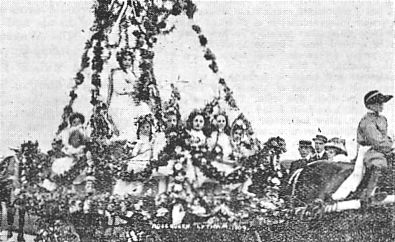 About two o'clock the St. Vincent's Boys' Band from
Preston arrived, and a procession was quickly formed, comprising the Rose Queen (Miss Mary
Blacoe) with her train- bearers, Marie Dobson, and Tom Candlish, and Maids of Honour, May
Board Isabella Dickenson, Beatrice Singleton, Adeline Porter, Edith Day, Marjorie Hardman,
Mabel White, Ruth Peet ; representatives of the various nationalities in gay attire, a tiny
little policeman (Richard Fairclough) who stalked along with most amusing mock dignity and the
following representative personages of the year 1800 : George III, Richard Shirt ; Queen
Charlotte, Miss Lizzie Cartmell, with Gertie Bayliss, Jane Fox, Bertha Parkinson as her maids;
Napoleon, Tom Salisbury ; Josephine, Miss Annie Gillett, with Evelyn Cookson, Mary Ormerod,
Lizzie Wilson, as her maids; Duke of Wellington Sidney Hood ; Lord Nelson, Chas. Bridges;
William Pitt, W. Dennis Lockey ; Chas. J. Fox, William Bamber ; Sir J. Moore, John Tipping ;
Lord Edward FitzGerald, John Hornby ; Sir Walter Scott, Walter Hardacre ; David Garrick, John
Boardman ; Jas. Watt Fred Dagger ; Sir Joshua Reynolds, Charles Fairclough ; Heralds, William
Maries and Harold Myers. About two o'clock the St. Vincent's Boys' Band from
Preston arrived, and a procession was quickly formed, comprising the Rose Queen (Miss Mary
Blacoe) with her train- bearers, Marie Dobson, and Tom Candlish, and Maids of Honour, May
Board Isabella Dickenson, Beatrice Singleton, Adeline Porter, Edith Day, Marjorie Hardman,
Mabel White, Ruth Peet ; representatives of the various nationalities in gay attire, a tiny
little policeman (Richard Fairclough) who stalked along with most amusing mock dignity and the
following representative personages of the year 1800 : George III, Richard Shirt ; Queen
Charlotte, Miss Lizzie Cartmell, with Gertie Bayliss, Jane Fox, Bertha Parkinson as her maids;
Napoleon, Tom Salisbury ; Josephine, Miss Annie Gillett, with Evelyn Cookson, Mary Ormerod,
Lizzie Wilson, as her maids; Duke of Wellington Sidney Hood ; Lord Nelson, Chas. Bridges;
William Pitt, W. Dennis Lockey ; Chas. J. Fox, William Bamber ; Sir J. Moore, John Tipping ;
Lord Edward FitzGerald, John Hornby ; Sir Walter Scott, Walter Hardacre ; David Garrick, John
Boardman ; Jas. Watt Fred Dagger ; Sir Joshua Reynolds, Charles Fairclough ; Heralds, William
Maries and Harold Myers.
It was a charming street spectacle, and won the admiration of the onlookers.
Owing to a misunderstanding, the procession was taken up the Beach to Lowther Gardens, instead of
along Church road, much to the disappointment of those assembled along the announced route. A good
number of people had already assembled both in and round the enclosure, and with the fountain
playing and a strong sun lighting up the whole of the gardens, it was an ideal setting for the
carnival, the huge stage having a beautiful background of trees.
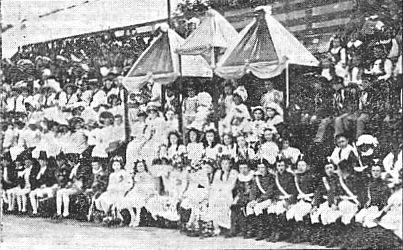 The processionists quickly took their places on the
huge platform, being “moved on" by the diminutive constable already referred to, canopies
being provided for royalty. The children got into their places without confusion, and
presented a kaleidoscopic effect in their various coloured dresses. A small orchestra, under
the direction of Mr. R. Shirt, led the singing, and considering the difficulties, including
that of having to arrange band parts from the piano score, they rendered excellent service.
The opening chorus " The Rose Queen comes," was given somewhat indecisively, the children not
having yet settled down to business. There was too much distraction in the audience as yet.
The arrival of the Rose Queen and entourage roused them to their work, and from thence things
went better. Miss Float, the retiring Queen, advanced to the front of the stage to meet the
Queen-Elect, and at the signal from Sidney Wood as the Duke - of Wellington, the Guard of
Honour saluted, whilst the Queen and her maids paraded to and from the roar of the stage. The processionists quickly took their places on the
huge platform, being “moved on" by the diminutive constable already referred to, canopies
being provided for royalty. The children got into their places without confusion, and
presented a kaleidoscopic effect in their various coloured dresses. A small orchestra, under
the direction of Mr. R. Shirt, led the singing, and considering the difficulties, including
that of having to arrange band parts from the piano score, they rendered excellent service.
The opening chorus " The Rose Queen comes," was given somewhat indecisively, the children not
having yet settled down to business. There was too much distraction in the audience as yet.
The arrival of the Rose Queen and entourage roused them to their work, and from thence things
went better. Miss Float, the retiring Queen, advanced to the front of the stage to meet the
Queen-Elect, and at the signal from Sidney Wood as the Duke - of Wellington, the Guard of
Honour saluted, whilst the Queen and her maids paraded to and from the roar of the stage.
THE CORONATION.
Councillor Barker, Chairman of the Council, then advanced to the front of the
platform, and said he had great pleasure in viewing the vast multitude of faces. He was sure Lytham
was out-doing any occasion or festival that they had ever previously had- He had great pleasure in
introducing the great rose queen crowner of Lytham.
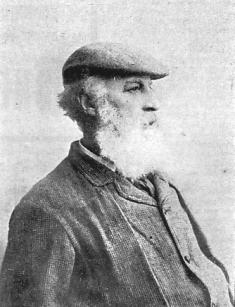 Mr. A. W. Clifton, the Grand Old Man of
Lytham, addressed the crowd with the words “First of all in the name of my kindly constituents
of Lytham, I bid you all welcome, great or small, natives or strangers." Continuing, he said
they were delighted to see them at that festival- It cheered them. The outing of such a grand
day as this would do them all good. He wanted most heartily to congratulate the Club Day
Committee on the magnificent salvage they had now produced from the wreck of Monday last. No
one could think that was the month of June. He knew it was by seeing Monday's crowd, otherwise
no one would have known. He was afraid he would not have been able to have made a speech. The
weather would have damped the energies of Lloyd George, and he wished it would have done.
(Laughter). Mr. A. W. Clifton, the Grand Old Man of
Lytham, addressed the crowd with the words “First of all in the name of my kindly constituents
of Lytham, I bid you all welcome, great or small, natives or strangers." Continuing, he said
they were delighted to see them at that festival- It cheered them. The outing of such a grand
day as this would do them all good. He wanted most heartily to congratulate the Club Day
Committee on the magnificent salvage they had now produced from the wreck of Monday last. No
one could think that was the month of June. He knew it was by seeing Monday's crowd, otherwise
no one would have known. He was afraid he would not have been able to have made a speech. The
weather would have damped the energies of Lloyd George, and he wished it would have done.
(Laughter).
He had the pleasure of crowning the rose queen, who was the daughter of one of
his most worthy and esteemed friends and neighbour, Mr. Blacoe. For over 30 years he (Mr. Blacoe)
had lived close to his house, and they had been linked in the bonds of friendship for that long
time. Indeed so close did they live together that he (Mr. Clifton) had thought of going up on
Saturday and kissing the rose queen just for practice, but too much blushing did not become the
cheeks of 80, and he thought he would defer that pleasure until that day, letting one blush suffice
for all. (Laughter).
Nothing could exceed Monday's deluge. Indeed children were dripping all over. He
dared say their mothers gave them a whipping for being so troublesome. He personally managed to
escape (Mr. Clifton did not specify the whipping or the rain). It was a most terrible day. He
wished the Queen all happiness this world could give, health, wealth—that he thought did not always
give happiness, but health did ; health, a cheery disposition and a joyous life. At this point the
garland of flowers was taken from the Rose Queen's head and Mr. Clifton put the crown in its place
amid cheers, addressing a few words to her. For a moment ho turned away until reminded by Mr. J.
Moore that he had not kissed her. He immediately turned round and gave her greeting, acknowledging
the laughter of the crowd by remarking "it was not forgetfulness—it was shyness. (Laughter)
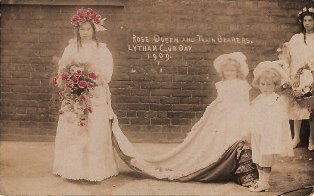
The revelries were then resumed, the old English Morris dance "Blue-Eyed
Stranger" being given by the following children from Ansdell Council School: Florence Howard, Irene
Madden, Jennie Morley, Amy Preston, Maggie Webster, Gladys Worth, Vincent Davies, Cecil Hall,
Winston Lindley, Harry Corbishley, Charlie Neild, Frank Webster.
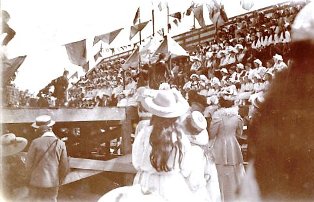
The children from St. Peter's gave the action, song "The haymakers" with great
gusto, giving us a real reminder that this was haymaking time, and after the song "Hearts of oak,"
the following boys and girls from St. John's danced the hornpipe, which was loudly applauded:
Phyllis Bamber, Jessie Chieseman, Nellie Draper, Gladys Embley, Doris Myerscough, Dorothy Nelson,
Agnes Walker, Annie Whiteside, Jas. Atkinson, Robert Holden, Arthur Hughes, Will Mercer, Jas.
Salthouse, Jno. A. Whiteside, J. Whiteside, Reggie Wood.
The Irish song "The wearing o' the Green" by the chorus was followed by the
spirited Irish dance by the following from St. John's: Elsie Charnley, Maggie Crawford, Ellen
Dickenson, Ethel Hartley, Doris Heald, Marion Hopwood, Lizzie Schofield, Lena Shirt, T. Berry, Con.
Bretherton, Harry Draper, Jack Mercer, Sam Myerscough, Eric Tipping, Fred Tipping, Reuben Waterer.
The turning-in of the toes was most amusing, but why didn't they "Hoch," without which no Irish
dance is complete. "Loch Lomond" was very acceptably sung, 15 prettily-attired girls from St.
John's dancing the Scotch sword dance. Here we got the "Hoch" though not so wholeheartedly as we
could have wished. A strain of quaintness was introduced by the Welsh children from St. John's
after the singing of "Land of my fathers." Then came the first of the tableaux acompanying the song
"Rule Brittania."
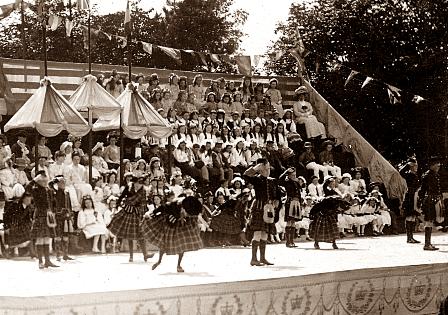
A guard of honour was formed through which came Richard Shirt as King George,
with Lizzie Cartmell as Queen Charlotte with Misses Gertie Bayliss, Jane Fox and Bertha Parkinson
in attendance. Several of the nationalities were "presented" during the tableau. Resuming the
carnival, the following Ansdell infant girls played at London Bridge exceedingly well, the exit
being very attractive: Mary Aitchison, Kitty Anderson, Abigail Armitage, Poppy Bolyes, Chrissie
Cartmell, Nellie Candlish, Laura Candlish, Mabel Dawes, Monica Davies, Annie Derbyshire, Mollie
Gillett, Gertrude Hardman, Mabel Halsall, Elsie Richards, Dorothy Rossall, Phyllis Watson ; and the
St. John's haymakers showed us how they made hay, their names being : Dorothy Bayliss, Dorothy
Bromley, Muriel Cartmell, Annie Crawford, Mary Fairclough, Lizzie Hornby, Ethel Johnson, Nellie
Bromley, Grace Whiteside, Phyllis Nelson, Gertie Pemberty, Mabel Shaw, Edith May Taylor, Phyllis
Tipping, Emily Williams, Lizzie Wilkin, Ethel Wilkin, Jane Wilkin, Gladys Wilson, Albert Webster,
Thomas Maries Fred Stringfellow, Harry Whiteside, Leonard Whiteside. The singing of the
"Marseillaise" prepared the way for a French dance of a very attractive nature by the following
children from St. Peter’s: Nellie Anyon, Gertie Cottom, Gertie Cross, Poppy Cross, Mary Jones,
Annie Mason, Florrie Prestcott, Monica Tomlinson, William- Butler, Frank Carr, Robert Carr, Robert
Cookson, Jack Fox, George Eccles, Edward Pendlebury, Jas. Tomlinson.
Along with the Spanish dance later, it was one of the best dances of the
afternoon. The English and French faced each other in battle array, and then we saw the sudden
death of Nelson (Chas. Bridges) and the more sudden "resurrection" which sent a laugh even along
the stage. The Spanish song "The maids of Seville" was bright and gay, and so was the dance of the
following St. Peter's girls, all in Spanish costume, and using castanets though it was somewhat too
long: Rita Battersby, Clare Carr, Henrietta Cowley, Annie Cross, Edith Cross, Rita Dobson Ada
Eccles, Annie Fox, Cissie Fox, Dorothy Fox Monica Fox, Nellie Fox, Edna Jackson, Marie Nixon, May
Nottingham, Agnes Smith.
Ansdell school children gave the old English Morris dance "Rigs o' Marlow”:
Florence Howard, Irene Madden, Jennie Morley, Amy Preston, Maggie Webster, Gladys Worth, Vincent
Davies, Cecil Hall, Winston Lindley, Harry Corbishley, Charlie Neill, Frank Whiteside ; and then we
had a well-designed Italian dance by the following children from St. Peter's, carrying tambourines
and making a picturesque scene : Lizzie Barlow, Mary Cookson, Gertie Dobson, Rosie Katie, Lizzie
Jamison, Ethel Notingham, Lizzie Salthouse, Nellie Singleton, Arthur Hallett, Frank Hallett, Teddy
Eccles, Chris- McNicholas, Tom Smith, Harold Swann, Jas. Taylor, Jack Worden. "When I was a young
girl" by the following children from the Ansdell Council School was a capital item, the little dots
enjoying the humours of the piece excellently, and drawing roars of laughter from the crowd—no mean
achievement at such a late hour: Mary Aitchison, Kitty Anderson, Abigail Armitage, Poppy Boyles,
Chrissie Cart- moll, Nellie Candlish, Laura Candlish, Mabel Dawes, Monica Davies, Annie Darbyshire,
Mollie Gillett, Gertrude Hardman, Mabel Halsall, Elsie Richards, Dorothy Rossall, Phyllis
Watson.
The singing of " Joan to the maypole away let us go" was the signal for a
popular part of all such carnivals, Mrs. Burgess having trained the following 24 girls attired in
yellow and heliotrope dresses to dance: Dora Aspden, Mary Bayliss, Mary Caffery, Grace Cookson,
Mary Dagger, Mary Doyle, Eliza Fisher, Le is Fisher, Madeline Fox, Eleanor Gillett, Edith Hallett,
Maggie Hodgson, Mary Kerr, Esther Myers, Ada Parkinson, Alice Parkinson, Bessie Rukin, Amy Stott,
Connie Shaw Gladys Tipping, Lizzie Waterer, Alice Whiteside, Bertha Wilson, Mary Alice Yates,
Zillah Colley. The proceedings closed with the combined tableau after which Master Fairclough sang
the solo " God save the King," Doris Myerscough being unable to sing, owing to illness-
Mr. H. Hoyle (St- John's) conducted the singing, and along with Mrs. Erwin, Miss
Irvin and Miss Lord, accompanied the various items.
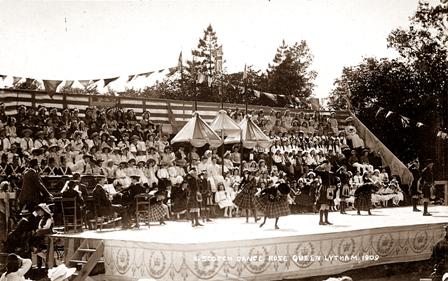
Presentation of Souvenirs.
During the proceedings, Mr. Jos. Moore, Chairman of the Club Day Committee,
introduced this matter, and said that last year's Rose Queen was promised a souvenir, but through
an oversight she did not get one. The gold souvenirs bore the inscription: "Rose Queen, 1909, Mary
Blacoe, St Peter's" and "Rose Queen, 1908, C. Float, St. Cuthbert's"
Mrs. E. W. Mellor then pinned the souvenirs on to the brests of the girls.
Mr. W. J. Hall proposed a vote of thanks to Mrs. Mellor for her presence He also
added Councillor T. V. Barker and Mr. A. W. Clifton for crowning the Rose Queen ; and all the
ladies and gentlemen who had given their service
See also "Mr Clifton on Suffragettes"
TO VISIT THE OFFICIAL WEBSITE FOR LYTHAM CLUB DAY
CLICK HERE
|